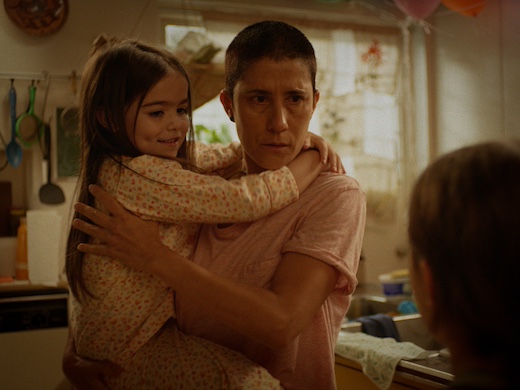‘Totem’ Captures a Day in the Life of a Large Latin Family
Director Lila Avilés, who also wrote the screenplay, has crafted something special here: a meditation on family and mortality that spares no emotional quarter, but remains an uplifting experience all the same.

The press notes accompanying “Tótem,” the new film from Mexican director Lila Avilés, describe it as a “choral film.” As a literary turn of phrase, it’s better suited for Ms. Avilés’s movie than, say, “ensemble piece.” The latter presupposes a group of individual actors who inhabit a story with equal emphasis; “choral” suggests something blended and organic, a whole in which parts aren’t summed up so much as made inviolable.
“Tótem” details one day in the life of one family — a subject that, by its very nature, lends itself to a choral format. Why, the director was asked, did she make a movie about a large family? “Mainly,” Ms. Avilés avers, “because families in Latin America are giant.” A similar lack of guile — a plain-as-the-nose-on-your-face groundedness — typifies her film.
We’re introduced to the family’s members through a deft cross-cutting of situations: mother and daughter in a public restroom; a middle-aged woman dying her hair; another woman busy in the kitchen; an older man trimming a bonsai tree. Bugs are abundant, as are cats, parrots, dogs, cousins, nieces, and nephews. Preparations are afoot for a celebration. Tensions simmer. Willfulness is the order of the day.
Where are we? Although the film was submitted by Mexico for consideration as the Best International Feature Film at the 96th Academy Awards, “Tótem” never makes specific its geographical location. It’s a Spanish-speaking country, that’s clear, as is the setting: an expansive upper-middle class household rife with books and art. The patriarch of the family is a psychiatrist who works from home; his grown children are conversant with poetry, myth, and the theater. But things are tough.

We learn soon enough why that is. Thirty-something Tonatiuh (Mateo García Elizondo) is bedridden with cancer and unable to to function without the aid of his caretaker Cruz (Teresita Sánchez). Cruz is the hired help, but you wouldn’t know it from the intimacy and patience that she extends toward her charge. Cruz is especially taxed on this, the day in question: Tonatiuh’s birthday. Will he be able to leave his bed for a party that is, let’s face it, more of a burden than a surprise?
Cruz hasn’t been paid for weeks. The elder sister in the family, Alejandra (Marisol Gasé), scrapes up what cash is available. The family has depleted much of its financial resources to pay for Tonatiuh’s medical care. This debt has ripple effects. Alejandra’s younger sister Nuri (Montserrat Marañon) drinks too much. Their father Roberto (Alberto Amador) is dismissive of the day’s events. His son, after all, is dying.
Ms. Avilés grounds the increasing chaos that ensues once the events of the day accumulate by centering her film on Tonatiuh’s 7-year-old daughter Sol (Naíma Sentíes). As the sounding board for the day’s events, Sol becomes increasingly lost within the blur of friends and family, but she does, after more delays than any small child should have to endure, spend one-on-one time with her father. Naíma Sentíes, in her first screen appearance, acquits herself with a rare dignity all the while retaining a true sense of what it is to be a child.
Ms. Avilés, who also wrote the screenplay, has crafted something special here: a meditation on family and mortality that spares no emotional quarter, but remains an uplifting experience all the same. Her brand of naturalism exhibits nary a seam and is helped immeasurably in this regard by the tender ministrations of cinematographer Diego Tenorio and, especially, a range of actors who never once tip their hands. “Tótem” is a sublime achievement.
Postscript: “Totem” didn’t make the cut for this year’s nominees for Best International Feature, a distinction that says more about the Academy of Motion Picture Arts and Sciences than it does about this wonderful film.

